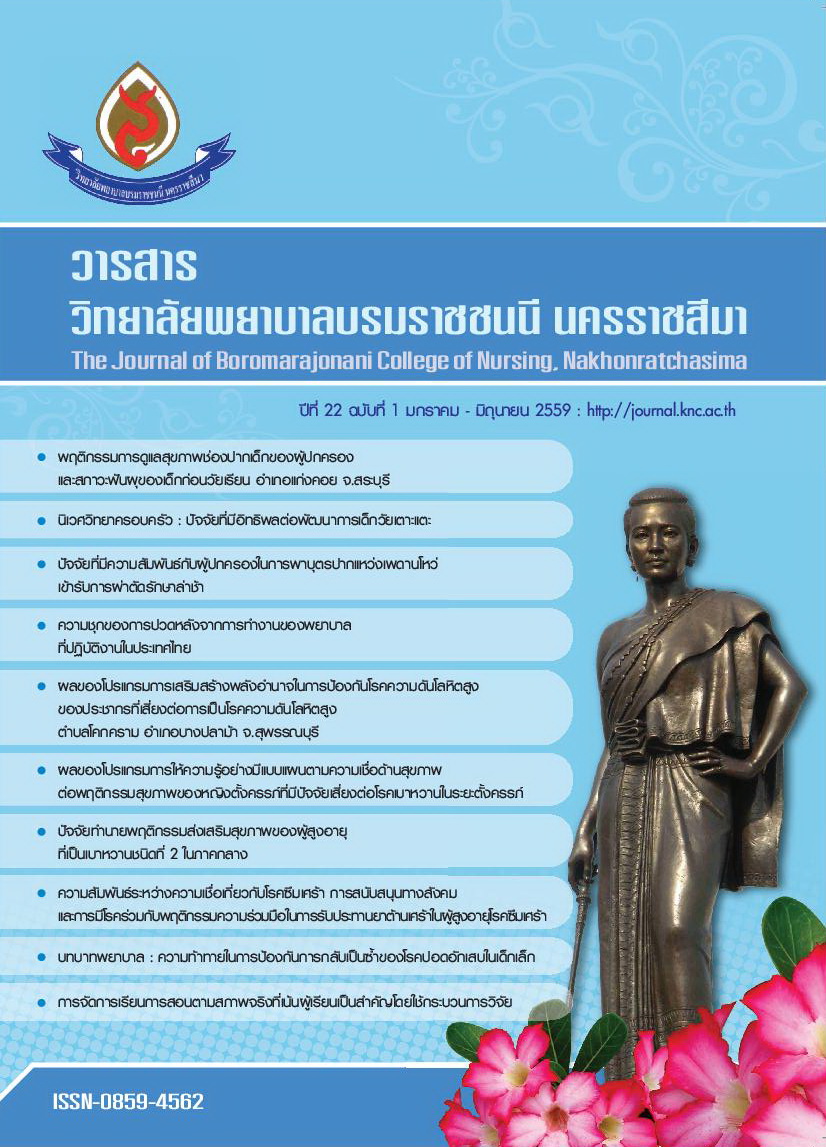ผลของโปรแกรมการให้ความรู้อย่างมีแบบแผนตามความเชื่อด้านสุขภาพต่อพฤติกรรมสุขภาพ ของหญิงตั้งครรภ์ที่มีปัจจัยเสี่ยงต่อโรคเบาหวานในระยะตั้งครรภ์
คำสำคัญ:
โปรแกรมการให้ความรู้, ความเชื่อด้านสุขภาพ, พฤติกรรมสุขภาพ, โรคเบาหวานในระยะตั้งครรภ์, หญิงตั้งครรภ์ที่มีปัจจัยเสี่ยงต่อโรคเบาหวาน, Education Program, Health Belief, Health behavior, Gestational Diabetes Mellitus, Pregnant women at risk for Gestational Diaบทคัดย่อ
การวิจัยกึ่งทดลองนี้ มีวัตถุประสงค์ เพื่อศึกษาผลของโปรแกรมการให้ความรู้อย่างมีแบบแผนตามความเชื่อด้านสุขภาพต่อพฤติกรรมสุขภาพของหญิงตั้งครรภ์ที่มีปัจจัยเสี่ยงต่อโรคเบาหวานในระยะตั้งครรภ์ กลุ่มตัวอย่างเป็นหญิงตั้งครรภ์ที่มีปัจจัยเสี่ยงต่อโรคเบาหวานมาฝากครรภ์ที่โรงพยาบาลโพนทอง จังหวัดร้อยเอ็ด จำนวน 30 คน สุ่มแบบง่ายเข้ากลุ่มทดลองและกลุ่มควบคุม กลุ่มละ 15 คน กลุ่มควบคุมได้รับการดูแลตามปกติ ส่วนกลุ่มทดลองได้รับการดูแลตามปกติร่วมกับโปรแกรมการให้ความรู้อย่างมีแบบแผน ที่สร้างตามกรอบแนวคิดแบบแผนความเชื่อด้านสุขภาพของเบคเกอร์และแมแมน เครื่องมือที่ใช้ในการวิจัย ได้แก่ แผนการสอนและคู่มือการปฏิบัติตนสำหรับหญิงตั้งครรภ์ที่มีปัจจัยเสี่ยงต่อโรคเบาหวานในระยะตั้งครรภ์ เครื่องมือในการเก็บรวบรวมข้อมูล ได้แก่ แบบสอบถามข้อมูลทั่วไปและแบบสอบถามพฤติกรรมสุขภาพของหญิงตั้งครรภ์ที่มีปัจจัยเสี่ยงต่อโรคเบาหวาน วิเคราะห์ข้อมูลด้วย สถิติพรรณนา สถิติทดสอบทีและสถิติฟิชเชอร์
ผลการวิจัยพบว่า
- ค่าเฉลี่ยคะแนนพฤติกรรมสุขภาพของกลุ่มทดลองสูงกว่ากลุ่มควบคุมอย่างมีนัยสำคัญทางสถิติ
(p < 0.001)
2. ค่าเฉลี่ยคะแนนพฤติกรรมสุขภาพของกลุ่มทดลองหลังได้รับโปรแกรมสูงกว่าก่อนการทดลองอย่าง
มีนัยสำคัญทางสถิติ (p < 0.001)
3. หลังการทดลอง ระดับน้ำตาลในเลือดของกลุ่มทดลองอยู่ในเกณฑ์ปกติมากกว่ากลุ่มควบคุมอย่าง
มีนัยสำคัญทางสถิติ (p < 0.001)
ดังนั้นโปรแกรมการให้ความรู้อย่างมีแบบแผน ช่วยให้หญิงตั้งครรภ์ที่มีปัจจัยเสี่ยงต่อโรคเบาหวาน มีพฤติกรรมสุขภาพที่ถูกต้องมากขึ้น มีผลดีต่อระดับน้ำตาลในเลือดและลดความเสี่ยงต่อการเป็นเบาหวานได้ สามารถนำไปใช้ในการดูแลหญิงตั้งครรภ์กลุ่มเสี่ยงต่อโรคเบาหวานได้
Effect of Health Belief Based Education Program on Health Behavior among Pregnant Women at Risk for Gestational Diabetes Mellitus
Abstract
This quasi experimental research aimed to study the effect of health belief based education program on health behavior among pregnant women at risk for gestational diabetes mellitus. The sample of 30 pregnant women at risk for gestational diabetes mellitus was taken from the antenatal clinic at Phonthong Hospital, Roi-et Province. The participants were divided into experimental and control groups with 15 women in each group by simple random sampling. The control group received routine care. The experimental group received health belief education program, developed by the researcher following the Health Belief Model of Becker & Maiman. The research instruments were health teaching plan and handbook about self – care behaviors for pregnant women at risk for gestational diabetes mellitus. The data collected using the demographic and self-care behaviors questionnaire. The data were analyzed using descriptive statistic, t-test and fisher exact test.
The results showed that:
- The experimental group had significant higher mean scores of health behavior than the control
group (p<0.001)
2. The experimental group had significant higher mean scores of health behavior than pre-test
(p<0.001)
3. The experimental group had significant higher normal blood sugar level than control group
(p<0.001)
The research showed that health belief based education program help improve pregnant women’s health behavior resulting in lower blood sugar level. The program could be used in nursing care for other pregnant women at risk for gestational diabetes mellitus.
Downloads
ฉบับ
บท
License
บทความที่ได้รับการตีพิมพ์เป็นลิขสิทธิ์ของ วารสารสุขภาพและการศึกษาพยาบาล ซึ่งดำเนินการโดยวิทยาลัยพยาบาลบรมราชชนนี นครราชสีมา
ข้อความที่ปรากฏในบทความในวารสารเล่มนี้เป็นความคิดเห็นส่วนตัวของผู้เขียนแต่ละท่านไม่เกี่ยวข้องกับกองบรรณาธิการวารสารสุขภาพและการศึกษาพยาบาล หรือวิทยาลัยพยาบาลบรมราชชนนี นครราชสีมา แต่อย่างใด ความรับผิดชอบองค์ประกอบทั้งหมดของบทความแต่ละเรื่องเป็นของผู้เขียนแต่ละท่าน หากมีความผิดพลาดใดๆ ผู้เขียนแต่ละท่านจะรับผิดชอบบทความของตนเองแต่ผู้เดียว






